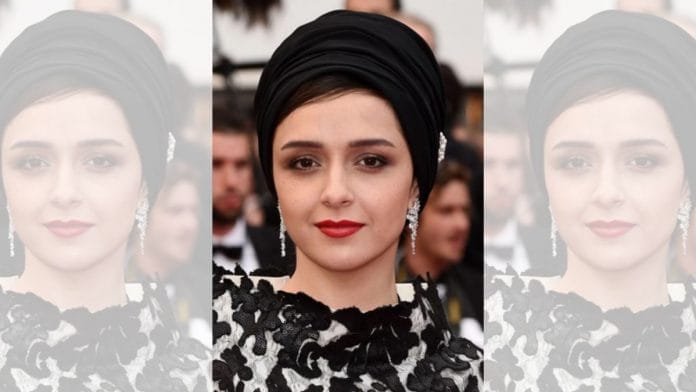New Delhi: Days after Taraneh Alidoosti came out in support of the ongoing student-led protests against the Iran government’s policy mandating the wearing of the headscarf by women, the veteran Iranian actor continues to be in news for her bold move.
This is, however, not Alidoosti’s first public statement on prominent political issues, both at home and internationally. The actor has previously courted controversy on numerous occasions, whether it be for sporting a “feminist tattoo” or a 2017 tweet refusing to attend the Academy Awards in retaliation against a policy of the then US government restricting travel of people from Muslim-majority countries to America.
On Thursday, Alidoosti attracted the attention of the international media by posting a photo of herself on Instagram which showed her without the traditional headscarf. The post came amid an ongoing protest against Iranian policies mandating the wearing of the headscarf, following 22-year-old Mahsa Amini’s death in the custody of the country’s morality police in September. Amini had been picked up by the morality police reportedly for wearing tight trousers.
Alidoosti’s post Thursday showed her holding a placard reportedly with the Kurdish slogan, “Woman. Life. Freedom”. The caption to the post read, “Your last absence, the migration of birds of sound, is not the end of this absence”.
Also read: How a case of Jehovah’s Witnesses refusing to sing national anthem guided judge’s hijab opinion
Who is Taraneh Alidoosti
Born on 12 January, 1984, Alidoosti is the daughter of sculptor and artist Nadere Hakimelahi and former Iranian footballer, Hamid Alidoosti, who took the field as a striker for clubs in Iran and Germany between the 1970s and the 1990s. He had also made 27 appearances for the Iranian men’s national team, scoring 15 goals.
Alidoosti’s film career began when she was still a teenager, when she played the titular character in Rasul Sadrameli’s I’m Taraneh, 15 — a 2002 drama about societal pressures on a young woman.
Within two years of her debut, Alidoosti became a frequent cast member in the films of one of Iran’s most internationally renowned directors, Asghar Farhadi. Collaborations between the two started with the 2004 film, The Beautiful City, and continued with Fireworks Wednesday in 2006.
The 2009 release About Elly and the 2016 The Salesman — a story-within-a-story feature that delves into issues like domestic violence, assault and post-traumatic stress disorder (PTSD) — also garnered critical acclaim for the duo.
Shunning the Oscars
However, The Salesman came amidst political and diplomatic turbulence between the United States and Iran, with then US President Donald Trump enforcing a controversial ban on civilian travel to America from several Muslim-majority countries, including Iran, in a purported anti-terror stance.
In a since-deleted Tweet responding to the Trump administration’s policy, Alidoosti in January 2017 had declared that she was boycotting the Academy Awards.
“Trump’s visa ban for Iranians is racist. Whether this will include a cultural event or not, I won’t attend the #AcademyAwards 2017 in protest,” Alidoosti had said.
The actor had also courted controversy from Iranians during the promotions of the film at the Cannes film festival several months earlier, for sporting a “feminist tattoo”.
Within a week of her stated boycott of the Academy Awards, director Farhadi followed suit, hitting out at the US travel restrictions and later writing an impassioned and politically-charged winners’ speech that Iranian-American astronaut Anousheh Ansari read out on stage at the Oscars ceremony.
Alidoosti had also reportedly criticised her country’s government in January 2020 amid protests by civilians, claiming in a since-deleted Instagram post that she and her fellow Iranians are “captives” rather than citizens.
The actor, however, continues to live and work out of Iran, even as many other prominent Iranians of her generation, such as her About Elly co-star Golshifteh Farahani, have long since left the country.
(Edited by Poulomi Banerjee)
Also read: Iran’s basketball team the latest to protest country’s hijab laws on international platforms






